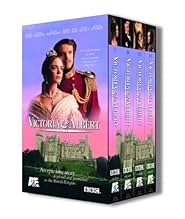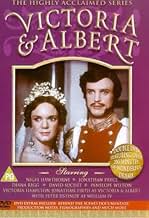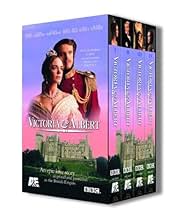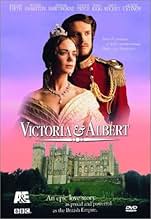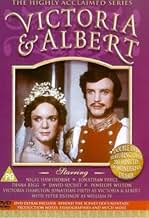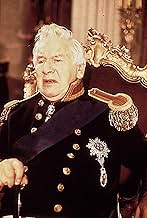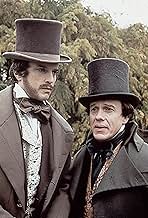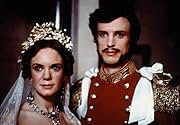Victoria & Albert
- टीवी मिनी सीरीज़
- 2001
- 3 घं 20 मि
IMDb रेटिंग
7.4/10
1.1 हज़ार
आपकी रेटिंग
अपनी भाषा में प्लॉट जोड़ेंThe marriage of Queen Victoria and Prince Albert, a longtime royal love story.The marriage of Queen Victoria and Prince Albert, a longtime royal love story.The marriage of Queen Victoria and Prince Albert, a longtime royal love story.
- 1 प्राइमटाइम एमी जीते
- 1 जीत और कुल 3 नामांकन
एपिसोड ब्राउज़ करें
फ़ीचर्ड समीक्षाएं
7=G=
"Victoria & Albert" examines the life Queen Victoria during the 24 year period from just prior to her coronation as Queen until the passing of her husband, Albert. Although this historical biopic spends precious little time with romance, it does dwell most on the relationship between the couple as they go about the business of working to bring dignity to a tarnished monarchy while raising a family and doing what royal couples do. Hamilton makes a solid centerpiece for this 3.5 hour miniseries which sports a capable ensemble and very good production value. If "V&A" has a liability, it is, perhaps, that the life of the Queen was not quite as interesting as the fictional lives of the characters from the more popular novels of the same period. Worth a look for those with an interest in Queen Victoria, the British monarchy, and the period. (B)
God, the Brits are good at this sort of thing! A 180-minute history lesson presented as a story of true love. Or maybe it's the other way round. Anyway the whole thing spins along at a merry pace, especially the first half with the intrigue surrounding Victoria's ascent to the throne and her marriage to Albert. Victoria Hamilton and Jonathan Firth really convince as V & A, as does Penelope Wilton as Victoria's domineering mother. We get the usual lashings of fine supporting performances from Nigel Hawthorne (Melbourne), John Wood (Wellington), Alex McCowen (Peel), Peter Ustinov (William IV), Delena Kidd (Queen Adelaide), Diana Rigg (Baroness Lentzen) etc etc. In fact the Baroness was just about the only character in the cast that doesn't have a piece of Australia named after them. As far as I know the only one of them that actually made it out here was Victoria's younger son Prince Alfie who was shot at by some deranged person in Mosman circa 1869. The leading teaching hospital in Sydney is named after him (how's that for trivia?)
Yes, the historical record is played around with a bit my sources have Baroness Lentzen (Victoria's governess) being given her matching orders in 1842, not 1840, and Albert didn't actually save Victoria from assassination at the hands of an Irish lunatic, though his progressive views on insanity as a defence to crime may have helped to save some of the insane from the hangman (US politicians take note). However, it was probably from Albert that Victoria got her Victorian morality, and he certainly was of great influence some say he was virtually King while he was alive, at least behind the scenes. As a German he had to keep a low profile in xenophobic Britain, but he gets the credit for the success of the Great Exhibition of 1851; even if Paxton (Richard Briers) actually designed the glass and cast iron `Crystal Palace' in which it was held, Albert had the sense to see that, flimsy as it seemed, Paxton's design was an ideal solution.
It is also sometimes forgotten that Victoria and Albert started out married life when barely out of their teenage years. Both were strongly influenced by older and more experienced people yet both managed to break free. While Albert may have been the better organised and disciplined of the two, Victoria had a remarkable determination to succeed at a particularly tough job. By the end of her long reign the British monarchy had been quietly transformed.
The voluminous correspondence of both parties (the Victorians seem to have written everything down) certainly suggest that Victoria was crazy about Albert, her first cousin, almost from the start, and that Albert, not so keen on Victoria to start with despite the dynastic advantages, grew to love her deeply. This is beautifully laid out in the film, and amongst all the splendour there is a remarkable intimacy. Someone (Melbourne?) suggests at one stage that Albert, through his influence over Victoria, had saved the British monarchy `for another 100 years.' Clearly, he is needed now. Somehow one cannot imagine an equally uplifting account of the present Queen and her consort being made, either now or in another 100 years.
Yes, the historical record is played around with a bit my sources have Baroness Lentzen (Victoria's governess) being given her matching orders in 1842, not 1840, and Albert didn't actually save Victoria from assassination at the hands of an Irish lunatic, though his progressive views on insanity as a defence to crime may have helped to save some of the insane from the hangman (US politicians take note). However, it was probably from Albert that Victoria got her Victorian morality, and he certainly was of great influence some say he was virtually King while he was alive, at least behind the scenes. As a German he had to keep a low profile in xenophobic Britain, but he gets the credit for the success of the Great Exhibition of 1851; even if Paxton (Richard Briers) actually designed the glass and cast iron `Crystal Palace' in which it was held, Albert had the sense to see that, flimsy as it seemed, Paxton's design was an ideal solution.
It is also sometimes forgotten that Victoria and Albert started out married life when barely out of their teenage years. Both were strongly influenced by older and more experienced people yet both managed to break free. While Albert may have been the better organised and disciplined of the two, Victoria had a remarkable determination to succeed at a particularly tough job. By the end of her long reign the British monarchy had been quietly transformed.
The voluminous correspondence of both parties (the Victorians seem to have written everything down) certainly suggest that Victoria was crazy about Albert, her first cousin, almost from the start, and that Albert, not so keen on Victoria to start with despite the dynastic advantages, grew to love her deeply. This is beautifully laid out in the film, and amongst all the splendour there is a remarkable intimacy. Someone (Melbourne?) suggests at one stage that Albert, through his influence over Victoria, had saved the British monarchy `for another 100 years.' Clearly, he is needed now. Somehow one cannot imagine an equally uplifting account of the present Queen and her consort being made, either now or in another 100 years.
I'm a BBCminiseries-aholic. I can watch even the most tedious efforts from the 70s and find them entertaining enough to watch several times. So it is no surprise that I like this. For my enjoyment, the biggest stumbling block of this miniseries is the casting of Victoria. To be fair, Victoria Hamilton (Victoria) is an actress I just don't care for. I've seen her in several things, and I just don't connect with her screen presence. She is a fine actress, always emotionally "present," but I do feel that I see the same 3 emotions over and over happy, sad, fussy. She is omnipresent through this piece, so
there you have it. She is lovely as the coming-of-age Victoria, but the biggest problem here is that she is not believable playing much over the age of 25.
This is a film that would have benefited immensely by double casting the leads/ breaking half way through to change them to older actors. (And one horrible mistake is opening and closing the film with an elderly wheelchair-bound Victoria played by another actress whose eyes are bright blue, and Hamilton's are brown.) Hamilton simply does not grow up enough, despite costumes and makeup.
Jonathan Firth (Albert) also suffers from the various age make-ups, fares much better, and brings more complexity to his role. He is always exceptional, and his role here is sympathetic, even when behaving badly, but he does look as if he had just finished crying during a lot of this film a bad allergy season, perhaps? He also does not make the transition to age believably.
Because of this, what makes this piece tick, run, and flow is the exquisite supporting cast. This is always the case with these BBC/A&E productions, and it may be what is really their core secret. People a town with geniuses, and any idiot can run the place . Well, that is what they do with their actors. Penelope Wilton has the standout performance as a desperate, emotional, miscalculating Queen Mum. David Suchet is simply perfect, and so far from Poirot you need to remind yourself that this is the same actor. Diana Rigg and Nigel Hawthorne also lend gravitas to production.
This production also features some really beautiful castle/historic locations, but this one is probably only for those who are addicted to the anglo-miniseries. (Almost exclusively indoor and talky, so boys will probably feel as pent up and useless as Albert did.)
This is a film that would have benefited immensely by double casting the leads/ breaking half way through to change them to older actors. (And one horrible mistake is opening and closing the film with an elderly wheelchair-bound Victoria played by another actress whose eyes are bright blue, and Hamilton's are brown.) Hamilton simply does not grow up enough, despite costumes and makeup.
Jonathan Firth (Albert) also suffers from the various age make-ups, fares much better, and brings more complexity to his role. He is always exceptional, and his role here is sympathetic, even when behaving badly, but he does look as if he had just finished crying during a lot of this film a bad allergy season, perhaps? He also does not make the transition to age believably.
Because of this, what makes this piece tick, run, and flow is the exquisite supporting cast. This is always the case with these BBC/A&E productions, and it may be what is really their core secret. People a town with geniuses, and any idiot can run the place . Well, that is what they do with their actors. Penelope Wilton has the standout performance as a desperate, emotional, miscalculating Queen Mum. David Suchet is simply perfect, and so far from Poirot you need to remind yourself that this is the same actor. Diana Rigg and Nigel Hawthorne also lend gravitas to production.
This production also features some really beautiful castle/historic locations, but this one is probably only for those who are addicted to the anglo-miniseries. (Almost exclusively indoor and talky, so boys will probably feel as pent up and useless as Albert did.)
I must admit I really enjoyed 'Victoria and Albert'. It was excellent. My only criticism of the film was it could have been a couple of episodes longer as it left out so many other possibilities rushing to reach its conclusion. Jonathon Firth was really very good as Prince Albert and Victoria Hamilton made a good job at Queen Victoria. I particularly liked Dame Diana Rigg as Baroness Lehzen and Penelope Wilton as the Duchess of Kent. Sir Peter Ustinov was marvellous as King William IV. Patrick Malahide was so completely odious as Sir John Conroy. I also found Nigel Hawthorne brilliant as Viscount Melbourne. Rachel Pickup was really very good as Lady Henrietta Standish and David Suchet was great as Baron Stockmar. Jonathon Pryce was adequate as King Leopold I. Elizabeth Spriggs was delightful in a cameo role in 'The Rivals'. I would really recommend this.
Since the days gradually came on the Royal Family in Great Britain that they are to reign rather than rule, the struggle has always been to be popular and stay popular without being self indulgent. They are the unifying symbol for their country rather than a written Constitution that we Yanks have, so they're behavior, good or bad, counts for so much more.
The folks who established that tradition were Victoria & Albert, first cousins in the Saxe-Coburg family and husband and wife. Through her father, the Duke of Kent, young Victoria was the heir to the British monarchy to which she ascended in 1837.
Royalty made its last gasp for power immediately preceding the events that are shown in this mini-series. King William IV played here by Peter Ustinov by royal prerogative dismissed the government of Prime Minster Earl Grey. Robert Peel formed a Tory government, but it only lasted for a few months because Parliament by now had firm control of the Treasury. William IV was forced to call back Earl Grey and bow to the wishes of the people's representatives, now even more representative since the Reform Act of 1832 reapportioned Parliament after several hundred years.
So the monarchy was to reign instead of rule, but if this bunch didn't keep a lid on the peccadilloes, the folks in the United Kingdom might just take it in their heads to be rid of them and get themselves a republic like their former colonies had done. That was the duty that Prince Albert (Jonathan Firth) saw it and he persuaded his young bride, Queen Victoria (Victoria Hamilton) that they must do the same.
Albert was a serious young man and Victoria had been leading a sheltered life courtesy of her mother Penelope Wilton had led a life away from the dissolute Hanoverian Court of Uncles George IV and William IV.
When you have no other purpose in life, but to set an example, you'd better be good at that. A few in the Royal Family haven't lived up to that down to this day. If you can't be good, at least be discreet.
Victoria & Albert is a good mini-series from the BBC capturing the ambiance of the early Victorian era very well indeed. Diana Rigg won an Emmy for her performance as Baroness Lehzen, young Victoria's governess who didn't quite know when to let go.
You can enjoy it even if you're not familiar with British history.
The folks who established that tradition were Victoria & Albert, first cousins in the Saxe-Coburg family and husband and wife. Through her father, the Duke of Kent, young Victoria was the heir to the British monarchy to which she ascended in 1837.
Royalty made its last gasp for power immediately preceding the events that are shown in this mini-series. King William IV played here by Peter Ustinov by royal prerogative dismissed the government of Prime Minster Earl Grey. Robert Peel formed a Tory government, but it only lasted for a few months because Parliament by now had firm control of the Treasury. William IV was forced to call back Earl Grey and bow to the wishes of the people's representatives, now even more representative since the Reform Act of 1832 reapportioned Parliament after several hundred years.
So the monarchy was to reign instead of rule, but if this bunch didn't keep a lid on the peccadilloes, the folks in the United Kingdom might just take it in their heads to be rid of them and get themselves a republic like their former colonies had done. That was the duty that Prince Albert (Jonathan Firth) saw it and he persuaded his young bride, Queen Victoria (Victoria Hamilton) that they must do the same.
Albert was a serious young man and Victoria had been leading a sheltered life courtesy of her mother Penelope Wilton had led a life away from the dissolute Hanoverian Court of Uncles George IV and William IV.
When you have no other purpose in life, but to set an example, you'd better be good at that. A few in the Royal Family haven't lived up to that down to this day. If you can't be good, at least be discreet.
Victoria & Albert is a good mini-series from the BBC capturing the ambiance of the early Victorian era very well indeed. Diana Rigg won an Emmy for her performance as Baroness Lehzen, young Victoria's governess who didn't quite know when to let go.
You can enjoy it even if you're not familiar with British history.
क्या आपको पता है
- ट्रिवियाNigel Hawthorne (Lord William Lamb, 2nd Viscount Melbourne) previously played Queen Victoria's grandfather King George III in The Madness of King George (1994).
- गूफ़At a state occasion prior to Victoria's marriage the orchestra is playing music from Strauss's operetta 'Die Fledermaus' which would not be written until many years later in 1874.
- भाव
Prince Albert: [Victoria bangs on Albert's study door] Who is it?
Victoria: [In a loud annoyed voice] What do you mean? "Who is it?" It's your queen!
Prince Albert: [Victoria takes a deep breath and calms down a bit knocks on the door calmly] Who is it?
Victoria: [In a calm and quiet voice] It's your wife.
[Albert opens the door and Victoria goes in and closes the door quietly]
- कनेक्शनVersion of Victoria the Great (1937)
- साउंडट्रैकZadok the Priest
George Frideric Handel (as Georg Friedrich Händel)
टॉप पसंद
रेटिंग देने के लिए साइन-इन करें और वैयक्तिकृत सुझावों के लिए वॉचलिस्ट करें
- How many seasons does Victoria & Albert have?Alexa द्वारा संचालित
विवरण
- रिलीज़ की तारीख़
- कंट्री ऑफ़ ओरिजिन
- भाषा
- इस रूप में भी जाना जाता है
- Victoria y Alberto
- फ़िल्माने की जगहें
- उत्पादन कंपनियां
- IMDbPro पर और कंपनी क्रेडिट देखें
- चलने की अवधि3 घंटे 20 मिनट
- रंग
- ध्वनि मिश्रण
- पक्ष अनुपात
- 1.33 : 1
इस पेज में योगदान दें
किसी बदलाव का सुझाव दें या अनुपलब्ध कॉन्टेंट जोड़ें




